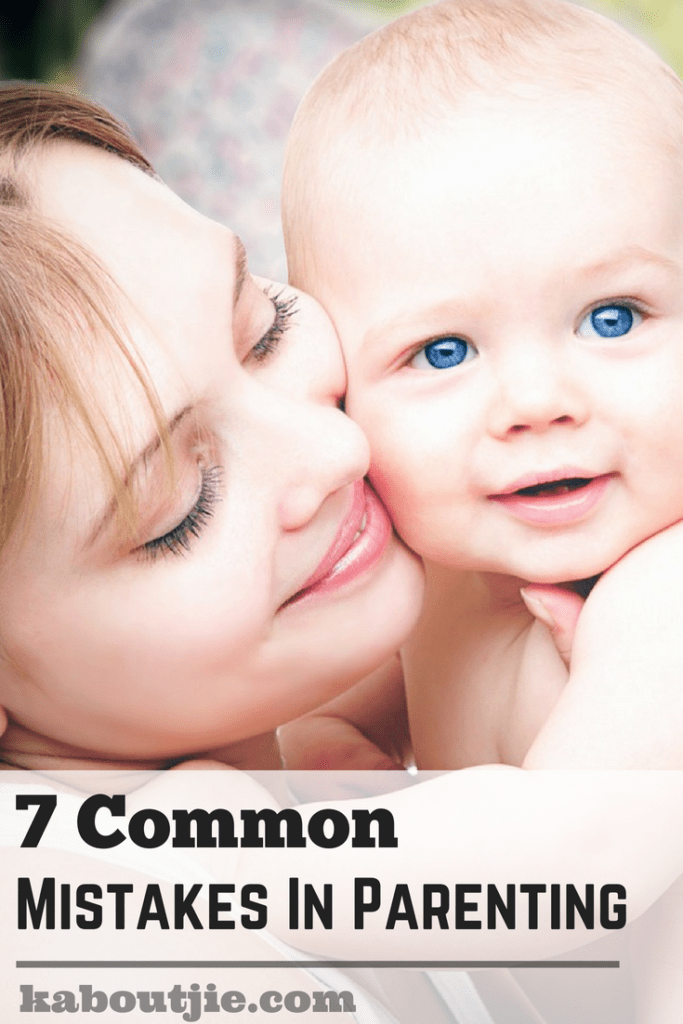Making mistakes in parenting is part of learning to be a parent. Have you committed any?
Being a parent is a responsibility and, especially, constant learning. As good parents, we all want the best for our children, the best care, the best education, the best opportunities … but as parents, we can also make mistakes in with our own choices and decision-making.
Some of the most common mistakes are not only made by first-time parents but sometimes, driven by that desire to be perfect parents, we can make mistakes rather than the best decisions. However, it is worth remembering that as parents we have the responsibility to teach a series of values and provide the necessary tools for their development and growth as a person. This means that, on occasion, we will have to say no to certain things or we will have to impose a punishment if they have behaved badly. It is not always easy to know what to do in each moment, nor is there an infallible recipe for not making mistakes in raising children.
What are the most common mistakes we make as parents when it comes to raising children?

1. Overprotection
Over-protection can have negative effects on the child’s emotional development. On the one hand, he may think that there is no-one more important than him or, on the contrary, become insecure when making decisions. It is one thing to help your child do homework and another thing when you end up practically doing it for your child.
Something similar happens if you do not order your room or do not take on the tasks that as you grow up you can undertake to help with household chores. Discover if you are a helicopter mother.
This is one of the mistakes that should be avoided because it deteriorates the authority or respect towards the other parent. If the two parents transmit a different message, the child will not know what to do. It is important, as the education expert’s advice, that the child perceive unity and consensus among the parents. Both when deciding everyday issues and when imposing rewards or new rules, it is convenient that they are agreed by both parents. Nor is it appropriate to derive responsibility for certain decisions from one of the parents, with answers of the type ‘ask your mother’ or ‘what your father decides’.
3. Letting yourself be carried away by fatigue
Sometimes we act moved, almost without realizing, by the state of mind. In fact, if we are tired or stressed we can make the mistake of adopting negative behaviors or attitudes or respond with phrases that you should not tell your children.

4. Unsuitable punishments
It is as wrong to impose a disproportionate punishment as to forget to have imposed it. It will be useless in both cases because the punishment must serve to educate and for the child to learn that behaving badly implies a series of consequences. Forget about punishing the child with not watching television for a month or without leaving the home for a whole month if he is a teenager, it is more advisable to be moderate and practical, for example limiting internet connectivity for a certain amount of time.
5. Comparisons between siblings
Remember that each of your children is different and that it is even possible that one of them requires, at a certain time, more attention. There is no-one better than the parents to know how each of their children is and what they need, and never make comparisons between them because that will only arouse jealousy and quarrels between siblings.
6. Unkept promises
If we promise something to our children, we have to fulfill it, because the opposite causes disappointment and will end up discouraging it when it comes to achieving a challenge. We do not set a good example if we do not keep the promises we give to parents, as this will also undermine the trust and respect our children feel towards us. Do not forget that as parents we have to set an example, and this is extendable to any behavior or situation that we face.
7. Not saying no
Children also have to learn the meaning of the word no, because, for example, they have to learn that there are minimum standards of coexistence. Otherwise, when we try to impose some rule it will be impossible.
About The Author – Thomas Kucharski
I’m a freelance writer. I’m a dad. I am far from a perfect dad. And I always will be. But I’m a damn good dad, and my son will always feel bigger than anything life can throw at him. Why? Because I get it. I get the power a dad has in a child’s life, and in a child’s level of self-belief. I work at Parrot Print Canvas
 Kaboutjie SA Mommy Blogs by Lynne Huysamen
Kaboutjie SA Mommy Blogs by Lynne Huysamen





Comparison between siblings is terrible, there is always difference between children and if they are compared it makes them become competitive towards their siblings which may disrupt the foundation of a good relationship.
I would never demotivate my one child to give praise to the other. Not all children are the same some excel academically whilst others are favoured in sport.
Comparisons between siblings is something that has been carried forward from many generations, and has become part of our society’s mentality.
As for unkept promises that just leads to your child become aggressive and have an unruly behaviour. I have seen this previously and I would never break a promise to my little one. He needs to know the value of a promise.
This article was a true reflection of our everyday lives that we generally turn a blind eye to. I thoroughly enjoyed reading this article. Thanks @Lynne
I do not promise anything to my children unless I am 100% sure I can follow through. I know what it feels like to be promised something and it doesn’t come through, I would hate for my children to feel that.
I feel it is important to point out each strength of my children. I do remind them that they are different with different interests and strengths as I find children naturally compare themselves to each other. By reassuring my children of their strengths and interests I find they are less inclined to compare themselves to other children and their siblings. Positive reinforcement is important to build self confidence.
I can relate to the fatigue and just going into auto pilot and how this affected my family negatively. I found myself responding negatively and my temper was way too short. It took me a long time to see this vicious circle as I was in it for so long. Once pulling myself out of it and getting the rest I need, I have found a change.
This was a very informative and sel reflecting article, thank you.
I’m definitely guilty of over-protection especially when JD was a baby.
I’ve slowly but surely started to relax a bit. I still keep a weary eye, but I’m not as bad as I used to be. Maybe because he is a toddler now. Not that it is much of a consolation because he is a bit prone to getting himself into trouble. He can be a bit clumsy at times and his head always seem to get in the way when he does things.
Luckily so far if I have promised something, I can deliver. But I don’t make promises that are too big of a risk either. I will make small promises that I know is doable, so I’m cheating a bit.
I’m still struggling most days to say no, and JD knows it. Whenever he start with the waterworks or tantrum (thank goodness not so often anymore) I tend to give in. But I am getting better at it. I sometimes call for backup on this. JD knows when his Dad says no, it is usually no.
My husband makes me very cross at times, because he tends to undermine my authority. Instead of taking my side, I end up being the one that he attacks or accuse of being wrong. And then I know I’m not because JD is plain naughty and getting his way. But I make a point of addressing it right away. I’ve learned that everything gets better with time by repetition, and this does not only apply to JD. 🙂